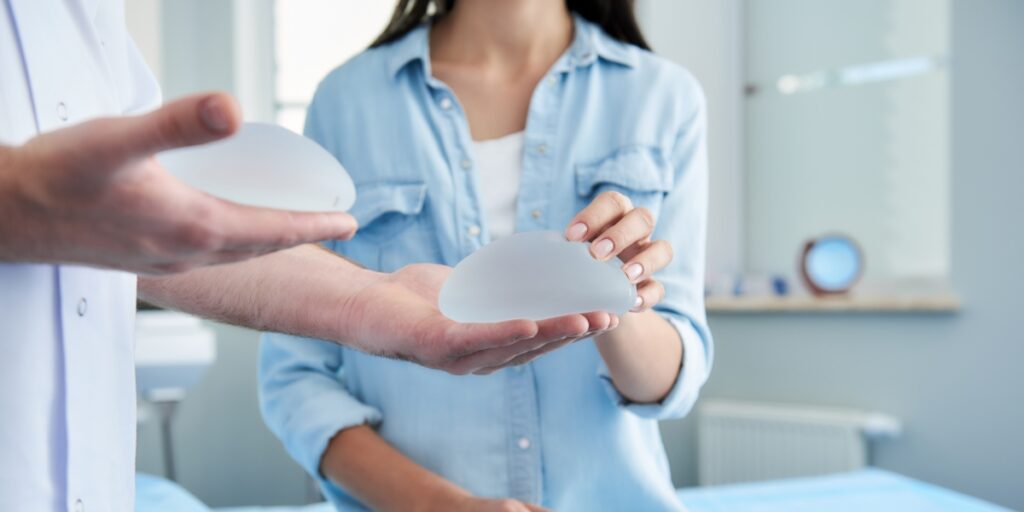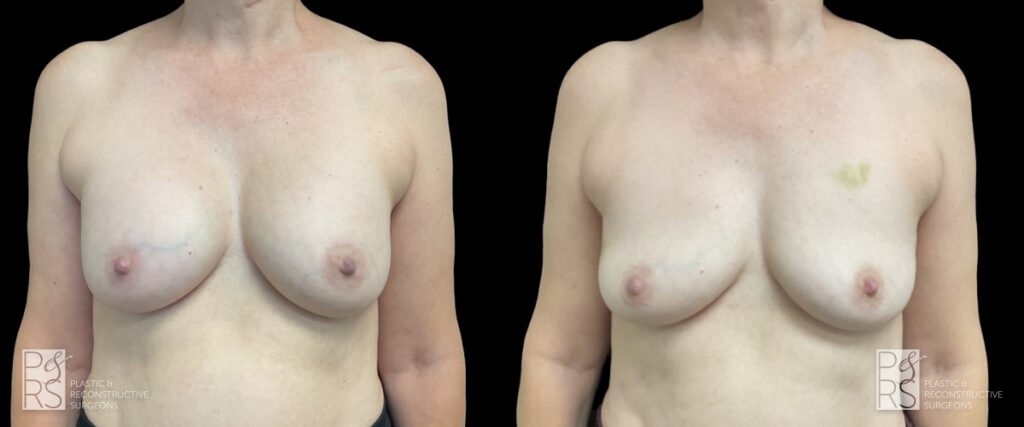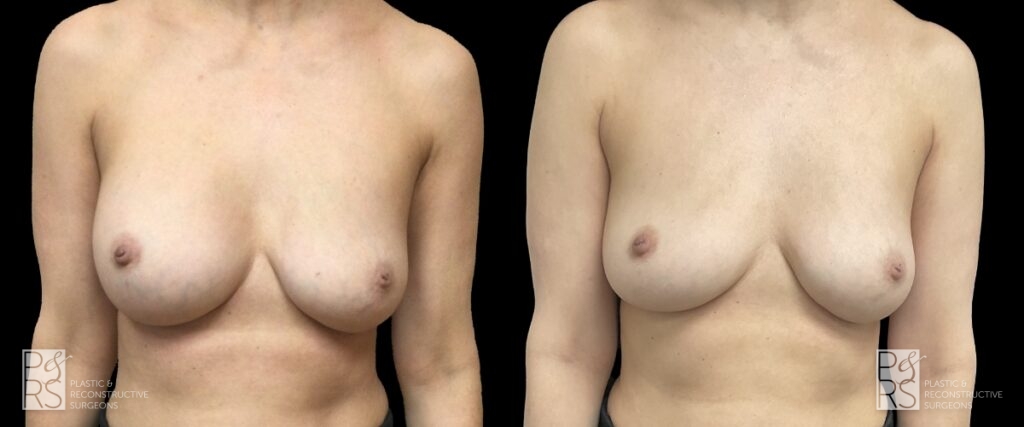Your symptoms are real, and you have the right to have your breast implants removed. We are your partners. There is no doubt that many with breast implants have several symptoms and medical issues negatively affecting their life. Our goal is to inform you about what information exists, as well as what we do not know about the link between breast implants and other illnesses before you have your breast implants removed. The research is ongoing. We want you to make a truly informed decision when it comes to having your breast implants removed.

What Is Breast Implant Illness?
Breast Implant Illness is a term used to attribute several symptoms and breast implants (silicone or saline). Breast Implant Illness is not Breast Cancer or Breast Implant-Associated Anaplastic Large Cell Lymphoma (BIA-ALCL). No test or imaging can confirm Breast Implant Illness, and it is not a diagnosis recognized by insurance.
The spectrum of concerns associated with breast implants include fatigue, autoimmune diseases (Raynaud’s, Hashimoto’s, Rheumatoid Arthritis, Scleroderma, Lupus, Sjogren’s, Multiple Sclerosis, infections, tender lymph nodes, persistent infections, toxic shock, fevers, night sweats, slow healing, easy bruising, sudden food intolerance, allergies), brain fog, memory loss, tinnitus, sore/aching joints, migraines, tinnitus, muscle/joint pain, numbness/tingling anywhere in the body, fibromyalgia, neuralgia/burning pain, discoloration of hands/feet, slow muscle recovery after activity, frequent urination, liver/kidney/organ problems, reduced libido, urinary tract infections, gastric reflux, gastritis, weight loss/gain, sudden dehydration, leaky gut, inflammatory bowel disease, stillbirth, melanoma, metallic tastes, choking, difficulty swallowing, pancreatitis, gallbladder disease, hair loss, dry skin, rashes, depression, anxiety, panic attacks, feeling like you are about to die, shortness of breath, heart palpitations, arrhythmia, heart pain, cough, sore throat and throat clearing.
In reading this list, we hope you understand why it is so difficult to fully understand what BII is and whether breast implants cause these issues (think of a singular issue, like lung cancer…if breast implants caused lung cancer, this would be easy to evaluate. And they do not cause lung cancer). When we are evaluating nearly a hundred symptoms, it is hard to determine if you would have developed these symptoms without implants or if your symptoms are due to the implants. This does not mean you do not have these symptoms. Much of the current research has inherent weaknesses, such as patients reporting certain diagnoses (a study in which a patient may be reporting “melanoma” when it could be a simple, early skin cancer is different than a doctor reporting a pathologic diagnosis of melanoma). We are almost always willing to remove your implants when safe (i.e., you are healthy), and we hope your symptoms improve after removal. We also want to make sure you understand there is no good evidence to support symptom improvement after removal. We just do not know if it will help you (but we hope it does).
I have not received a definitive answer from any surgeon I have spoken with.
We believe you! A doctor and surgeon’s duty is to first do no harm to their patients. All of our surgeons are here to serve and protect you. We believe your symptoms are real. But we want you to know there is currently little evidence to support the impact of breast implant removal on Breast Implant Illness. Around only 50% of patients feel their symptoms improve after implant removal. There is plenty of evidence supporting the short-term complications of breast implant removal (bleeding, hematoma, return to the operating room, and significant out-of-pocket costs associated with these surgeries), which is why we worry for you. Several studies looking into women with and without breast implants have demonstrated the same rate (read ‘it might not be the breast implants’) of several of the symptoms mentioned above. It is very difficult to demonstrate one thing (anything, i.e., implants) does not cause another thing in medical research. Knowing this, patients that want their implants removed for any reason rarely regret implant removal, including when their symptoms do not resolve and even when their symptoms worsen after implant removal.
It is important to know that we are always considering the consequences of undergoing any operation, including those rare consequences that are potentially life-threatening. We will always ensure that you are aware of the information regarding Breast Implant Illness in an effort to allow you to make an informed decision, confirm your willingness to undergo the operation, and (understanding that implant removal may not improve your symptoms) you are still willing to undergo surgery to remove your implants. Most patients are! If this is the case, we are your team, one that will support, serve you, protect you, and guide you through the breast implant removal process.
Real Patient Results

Who studied breast implants?
In the early 1990s, a moratorium was placed on silicone breast implants for a variety of reasons. This moratorium was lifted in 2006 when no link was demonstrated between breast implants and other medical disorders. Since that time, the FDA (United States Food and Drug Administration) has required implant manufacturers (there are three major manufacturers, Mentor, Sientra, and Allergan) to maintain and publish data on their implants for a minimum of 10 years. To date, no implant manufacturer has continued data publication after 10 years (as of this writing). If you have had your implants for longer than 10 years, the research may not explain your experience. This does not mean you are wrong; this means we just do not have any good information on what happens to patients with implants 15, 20, 25, or 30 years after having their implants placed.
Scientifically, Breast Implant Illness Does Not Exist. But…
We are here for you. If you believe you want your implants out for any reason, we want you to know your options.
I am going to get lab tests to confirm Breast Implant Illness.
If your tests are being ordered by a physician that believes you may have other illnesses, this is normal. If a practitioner is ordering tests to diagnose BII (and this may be financially consequential to you), do not follow through with these tests until speaking to a Board-Certified Plastic Surgeon (by the American Board of Plastic Surgery). There are no tests that confirm BII or that your symptoms are due to your implants, and no qualified plastic surgeon will remove your implants due to a blood test or imaging.
My ANA titers are high. I need my implants removed.
Yes, your ANA titers may be high, and you have breast implants. Unfortunately, it is very hard to decipher if you would have developed this issue without breast implants. If you believe it is due to your breast implants, or want to have them removed to eliminate the possibility, we are here for you.
If you have not established a relationship with a Rheumatologist (a physician who specializes in pain and inflammatory diseases), we highly recommend you do so prior to having your implants removed. This is the best way to evaluate and track your symptoms as well as measure potential improvement after implant removal, and we strongly encourage measurement of your symptoms and bloodwork for up to 2 years following your implant removal to monitor for improvement (or worsening).
Social Media and Breast Implant Illness
Social media has empowered patients immensely and in a wonderful way. This was evident prior to the Covid pandemic, specifically regarding Breast Implant Illness. Just as with any platform, it is important to know there is misinformation about Breast Implant Illness propagated on all social media platforms and amongst social media groups, including those solely focused on Breast Implant Illness. Social media frequently becomes validated in numbers, with at least one Breast Implant Illness group having over 100,000 members. It is important to understand that, though many people have concerns and listen to information on several platforms, this does not mean what is shared and discussed is accurate or up-to-date information. Unfortunately, these platforms tend to make you feel more anxious about your symptoms and keeping your implants. Some patients have shared they felt bullied into having their implants removed, or shamed for choosing to keep their implants. This should never weigh into your decision to have your implants removed.
Our surgeons will never under or overpromise relief of your symptoms or guarantee your symptoms are due to your implants. The current data would not support us in doing so. Our goal is to protect you. Knowing this, if you choose to have your implants removed, we will always do this in the safest manner possible and cheer for improvement in your symptoms. We are always willing to remove your implants when it is safe and when we have the appropriate expectations.
Real Patient Results

Breast Implant Removal Cost
Breast implant removal after cosmetic augmentation is infrequently covered by insurance, even if you feel your symptoms are due to your implants. There are certain situations where portions of the procedure may be covered by insurance that can help offset the cost of the procedure for you. When we recognize a situation where insurance may cover portions of the procedure, we will always attempt insurance pre-authorization on your behalf.
If your implant(s) were placed for reconstruction, insurance would cover implant removal for you, and you may have options (including the DIEP flap) to naturally maintain your breast mound, without implants, after implant removal.
Symptom Improvement After Implant Removal
Many of the symptoms patients present with Breast Implant Illness are not measurable, making it hard to understand if they truly improve. This does not mean your symptoms will not improve after breast implant removal. Some studies have demonstrated a significant improvement in many symptoms as well as a reduction in distress and anxiety regarding your implants after removal.
When measurable outcomes were investigated (i.e., ANA for inflammatory disease), there has been no consistent improvement in ANA or symptoms after implant removal, and studies have shown that rheumatoid arthritis continues to progress (i.e., worsen) despite implant removal. Some studies have demonstrated improvement in rheumatologic symptoms for a short period of time (6-12 months), but those symptoms recurred 1 year after implant removal. We share this so that you can make a truly informed decision prior to removing your implants.
Wait, some people are unhappy after implant removal?
Yes! This is one of our many concerns on your behalf. Many patients find out their Breast Implant Illness symptoms do not change despite implant removal. This does not mean that these patients regret their decision. But they may not be happy with their appearance. We always want you to be prepared for all situations after surgery, especially those that may cause you worsened quality of life, dissatisfaction with your appearance, and the potential desire for additional future surgery.
Will you guarantee me en bloc explantation? Another surgeon said this was “standard of care.”
No surgeon should ever guarantee you en bloc explantation nor ever use the term “standard of care” when discussing this with you. This is a HUGE red flag unless there are concerns you have cancer or BIA-ALCL. We will always attempt en masse explantation (explantation with the capsule). The ability to perform en bloc explantation without violation of the capsule is entirely determined by the intraoperative (during surgery) findings. Your body has reacted to and formed scar tissue that is different from anyone else. We cannot predict how this capsule has formed until we are in the operating room.
A well-trained surgeon with expertise in breast implant explantation would never guarantee en bloc explantation because they know this is not always possible. When your implant has been placed underneath the pectoralis muscle, en bloc explantation risks a pneumothorax (a life-threatening injury to your lung), death, severe bleeding, and severe postoperative pain potentially leading to pneumonia, long-term opiate use, and chronic disability. So please, ask any surgeon guaranteeing this about these risks.
We are typically able to remove the overwhelming majority of your capsule. We will always remove any suspicious portions of your capsule as well as attempt en masse explantation, but we also know this is not always safe for you. When it is not safe for you, we will remove your implants, the overwhelming majority of the capsule, and leave behind very small portions of the capsule so that you are not harmed.
But there are studies demonstrating capsules with bacteria in them, biofilms, toxins, and silicone in the breast capsule and tissue, etc…
Yes, this is absolutely true. The silicone compound does leak into the surrounding tissue, without a doubt. Whether or not this is causing a problem is a completely separate issue. And right now, it does not seem to be a problem (though it may be hard to believe when you have implants and these issues). For this reason, we always attempt to remove the entire capsule when safe.
Another doctor guaranteed me en bloc implant removal or touted themselves as an “explant expert.”
We strongly encourage you to talk to a surgeon board certified by the American Board of Plastic Surgery before moving forward with your procedure and one that talks to you about the above issues before performing explantation. Seeing a ‘plastic surgeon’ does not guarantee they are trained in surgery of the breasts, and we encourage you to perform your research (this is just as, if not more important than any research you perform on breast implant explantation).
I think I have some of the capsule left after my explantation. I want this removed.
We can never guarantee the removal of the remaining capsule. This is difficult surgically. We cannot discern what is capsule from what is not after you have had multiple breast surgeries (implant placement, implant removal, and capsulectomy). If any surgeon is guaranteeing that surgery will remove any remaining capsule tissue, we strongly encourage you to meet with us before moving forward with this operation.
What will you do with my capsule and implants?
We will generally take pictures of your capsules and implants after the procedure is completed. Your capsules must be sent to pathology to perform special staining and examination methods to rule out malignancy (cancer). On a case-by-case basis, we can discuss what can be done with your implants. Cultures will be taken of your implant cavity only when there is evidence of infection (this is rare).
I have textured, shaped implants. I should have them removed, correct?
The short answer is ‘no.’ But you should always discuss this with your implanting surgeon first. We are always happy to discuss your options with you.
Talk to the professionals at Plastic & Reconstructive Surgeons in Renton and Maple Valley about how we can help with Breast Implant Illness and breast implant removal. Contact us or call today to schedule your consultation at (425) 228-3187.
 (425) 228-3187
(425) 228-3187
